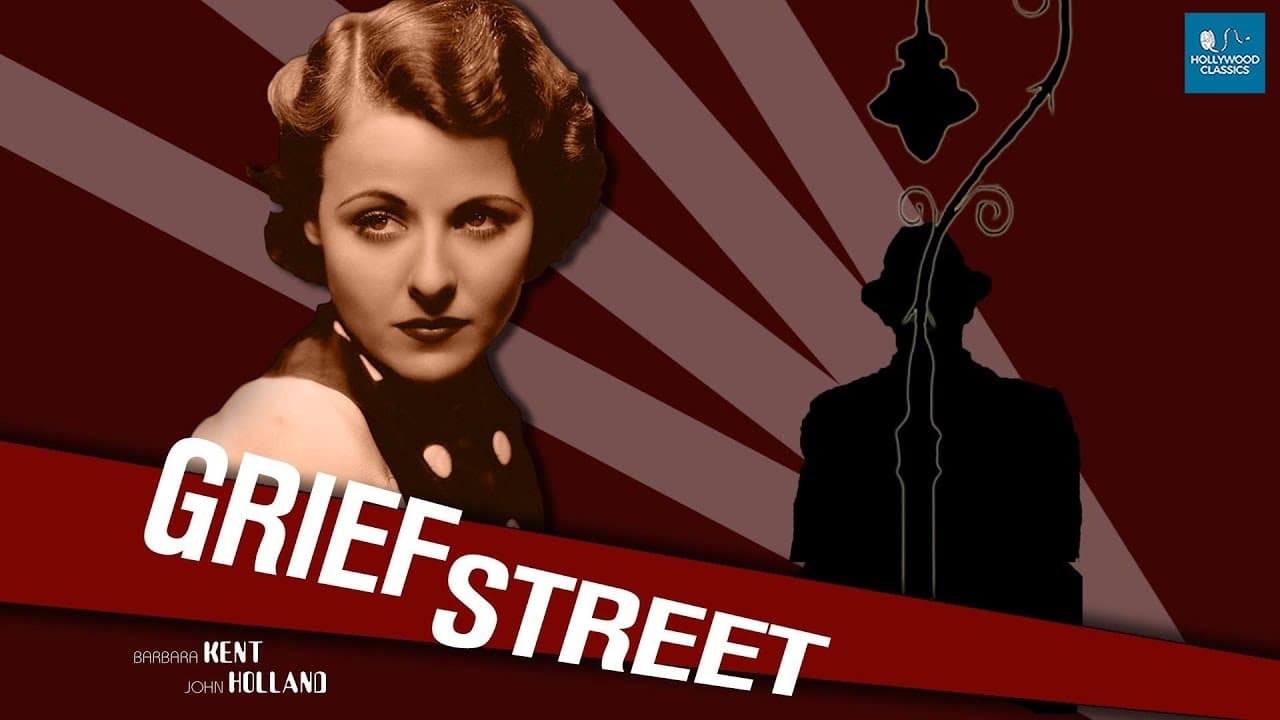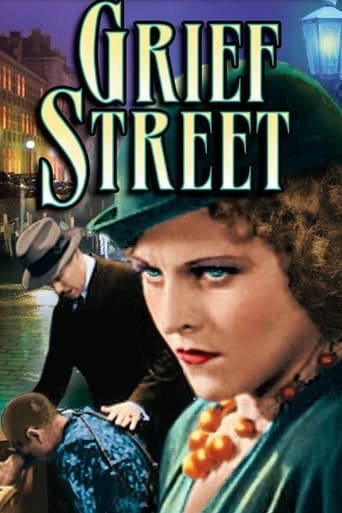


Entertaining from beginning to end, it maintains the spirit of the franchise while establishing it's own seal with a fun cast
... View MoreIn truth, there is barely enough story here to make a film.
... View MoreThe movie turns out to be a little better than the average. Starting from a romantic formula often seen in the cinema, it ends in the most predictable (and somewhat bland) way.
... View MoreThe story, direction, characters, and writing/dialogue is akin to taking a tranquilizer shot to the neck, but everything else was so well done.
... View MoreDuring the 1930s and 40s, Hollywood made one murder mystery after another--and almost all of these were low-budgeted B-movies. Some, such as the Charlie Chan and Falcon series were very good and the rest were a rather mixed lot. Few were excellent--but the films ran the gamut from awful to pretty good. "Grief Street" is one of the less distinguished murder mysteries--mostly because the writing was a bit too broad and obvious. The worst of it was having an annoying and offensive stutterer in the film for comic relief. It's hard to imagine that a multiple Oscar-winning guy like Walter Brennan would begin his distinguished career with crap like this!As far as the murder goes, it's all laid out at the beginning of the film--perhaps too well. In other words, there isn't much suspense--you KNOW the guy is going to get killed and the basic formula is there with little to differentiate it from the rest apart from the god-awful stuttering guy and a few other broad performances! Not a total waste of time but an imminently skippable film, that's for sure.
... View MoreYou would really know you're making a poverty row picture when you are handed a title like "Grief Street". Poor Barbara Kent, the sensitivity she portrayed in "Lonesome" never stood her in good stead. She was never really thought good enough to be made a star - the nearest she came to Hollywood royalty was as the nice girl (read bland) in "Flesh and the Devil" and with Greta Garbo and John Gilbert burning up the celluloid and publicity, who remembers Barbara."Grief Street" was a poverty rower in name only, certainly not in production values and all the female members of the cast looked terrific. Chesterfield must have had make-up artists at the ready - Barbara Kent look stunning as did Lillian Rich and Dorothy Christy.The film jumps right into a scene of domestic betrayal in which Alvin Merle returns home to find his wife in the arms of another man, his wife is shot and he resignedly rings the police - but what's this??, it's only an illusion, being the last scene in Merle's latest Broadway bonanza. After a run-in with an elderly doorman who let's fly with his real feelings about "ham" actors, he retires to his dressing room where he is later discovered - dead!!!And the police soon discover there are many people on the Great White Way who have a reason for wishing the philandering actor dead. There is his wife Ethel Wynn (Dorothy Christy) who cannot hide her happiness at the news. Also a young girl who comes to the theatre desperate to see Merle, Jean Royce (Kent) who's story seems full of holes, Merle was infatuated her and lost her her job at a regional theatre. Strangely, she is never a suspect - even when she blithely explains her penthouse apartment (which is just gorgeous, an opulent Art Deco structure that must have taken a big chunk out of Chesterfield's budget) as a present from her liberal, rich father and her acting career is explained away as something she does just for the fun of it!! Someone is also leaving her notes that may be the key to the whole case, although the police are not informed. Definitely easy to pick the killer during the last 15 minutes although before that you are really kept guessing.The cast is a cornucopia of old and new. Walter Brennan was given one of his ghastly stuttering roles again - wasn't Roscoe Ates available?? Lillian Rich was Merle's latest fling - in the twenties she was the star of Cecil B. DeMille's "The Golden Bed" which evoked all the lavish images of a decadent society, typical DeMille, but by the early 1930s she could barely get a credited role on poverty row. Dorothy Christy, usually better than the parts she was given, though here she had one small scene where she is interrogated by the police, is better known as the lady who is uppity with Shirley Temple in "Bright Eyes" (1934). Creighton Hale from D.W. Griffith roles and "The Cat and the Canary" had a blink and you'll miss him role as an actor in the pivotal play. And male lead was Jim Holland who didn't make many movies and seemed to be a poor man's Lloyd Hughes - and that's pretty poor!!
... View MoreBy the humble standards of Poverty Row, this is a first-class mystery thriller. The script plays fair as to the murderer's identity and his or her modus operandi. Fast-moving Richard Thorpe has directed with a sure hand – I love the way he moves the camera back into the stalls for that startling trick opening – making excellent use of his players and sets, while cameraman Mil Anderson has contributed appropriately atmospheric lighting. Diminutive but gorgeous Barbara Kent plays the heroine with just the right blend of sparkle and mystery. Admittedly, the movie is slightly let down by comic relief James P. Burtis, who tends to over-do his earlier scenes but becomes less out-of-key aggressive as the movie progresses. John Holland is a bit too stolid as the hero, but Lafe McKee gives a fine account of the stage doorman and although he is way down the cast list, Raymond Largay is on screen constantly and certainly impresses as Police Captain Blake. Dorothy Christy's role is small, but she makes an impression in her brief appearance, while Walter Brennan fans will be surprised to find their hero in a comic role as a stuttering newshound. By the humble standards of Chesterfield, production values are quite impressive, as this one was shot at Universal Studios (presumably at night) and made excellent use of that studio's standing sets. Available on an excellent Alpha DVD.
... View MoreThis second feature directed by jack-of-all-trades director Richard Thorpe -- he would go to Metro as a B movie director and graduate to big spectacles, based on his ability to get a cheap performance out of actors like Robert Taylor -- shows Thorpe with warts and details of care.This locked room mystery has its major weak points, like stagily-read performances from all hands involved, but it also has its strengths, rocking, as it does, between a comedy drama in which the cops spend their time playing craps, and an early police procedural, as one cop uses routine and careful deduction to crack the case. And while Thorpe can't raise a good performance, he does take care of his visuals, as in the scene set in an alley, where he sets the wind machines to gently blowing Barbara Kent's hair.Although not a particularly good movie, it is interesting as a transitional piece, as silent stars try their hands at talkies, and a style of mystery different from the usual Sherlock Holmes or Philo Vance pointing out what is obvious after the fact.
... View More